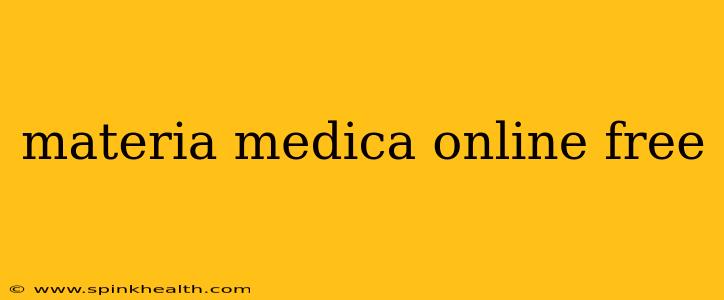Exploring the World of Free Online Materia Medica Resources
The quest for knowledge, especially in the vast and intricate field of Materia Medica, often leads down winding paths. For those seeking to understand the therapeutic properties of substances, the sheer volume of information can be overwhelming. But fear not, intrepid explorer! This journey will guide you through the landscape of freely available online Materia Medica resources, revealing hidden gems and navigating potential pitfalls along the way.
My name is Dr. Evelyn Reed, and for over two decades, I've been immersed in the study of Materia Medica. I've witnessed firsthand the evolution of information access, from dusty tomes to the vibrant digital landscape we inhabit today. This article is a culmination of my experience, designed to help you navigate the world of free online resources effectively and safely.
What is Materia Medica, and Why is Free Access Important?
Materia Medica, at its core, is the study of the therapeutic uses of drugs and substances. It's a rich tapestry woven from botany, chemistry, pharmacology, and clinical experience. Access to this information is paramount for healthcare professionals, students, and anyone with a genuine interest in understanding how substances interact with the human body. Free access democratizes this knowledge, leveling the playing field and ensuring a broader understanding of therapeutic options.
Where Can I Find Free Materia Medica Resources Online?
Finding genuinely reliable and free resources requires a discerning eye. Many websites offer snippets of information, but comprehensive, accurate Materia Medica requires careful sourcing. Here are some avenues to explore, along with crucial caveats:
-
University Libraries and Open Access Journals: Many universities offer online access to their digital libraries. These repositories frequently contain digitized versions of historical Materia Medica texts, research articles, and scholarly works. The quality is generally high, but accessing some content might require navigating institutional login processes. Open access journals provide a wealth of free, peer-reviewed research on specific substances and their therapeutic applications.
-
Government Health Agencies: Organizations such as the National Institutes of Health (NIH) in the US and equivalent bodies in other countries often publish free resources related to drugs and their effects. These resources can offer valuable insights, but usually focus on specific substances or classes of drugs rather than offering a comprehensive overview.
-
Online Encyclopedias and Databases: While some online encyclopedias offer information on medicinal plants and substances, always exercise caution. Verify the information against multiple reliable sources, especially if you're relying on it for health decisions.
Important Note: While many free resources exist, relying solely on free online sources for medical advice is strongly discouraged. Always consult with a qualified healthcare professional for any health concerns or before making decisions based on information found online.
Are There Any Downsides to Using Free Online Materia Medica Resources?
Absolutely. The very nature of free access means that quality control can be inconsistent. Be wary of:
- Unverified or outdated information: The internet is a wild west of information. Always check the publication date and source credibility before relying on any information.
- Bias and inaccuracies: Some websites may promote specific products or treatments, potentially leading to biased or inaccurate information.
- Lack of context: Snippets of information taken out of context can lead to misinterpretations. Always seek the broader picture before drawing conclusions.
What Kind of Information Can I Expect to Find in a Free Online Materia Medica?
The information found varies significantly depending on the source. However, you might encounter details such as:
- Botanical descriptions: For plant-based remedies, you'll find information on the plant's identification, morphology, and habitat.
- Chemical composition: This details the active ingredients and their chemical structures.
- Pharmacological actions: This describes how the substance interacts with the body on a cellular level.
- Therapeutic uses: This outlines the substance's traditional and modern medicinal applications.
- Dosage and administration: This provides guidance on how to use the substance safely and effectively (though always consult a professional).
- Side effects and contraindications: This outlines potential adverse reactions and situations where the substance should not be used.
How Can I Ensure the Accuracy of the Information I Find?
Cross-referencing is crucial! Never rely on a single source. Consult multiple sources, particularly those from reputable academic institutions or government agencies. Look for peer-reviewed research articles and avoid websites with promotional content or unsubstantiated claims. If you're unsure about the accuracy of information, consult with a qualified healthcare professional or librarian experienced in medical information retrieval.
Embarking on a journey through free online Materia Medica resources is an exciting endeavor. By employing careful discernment, cross-referencing sources, and consulting with professionals, you can unlock a treasure trove of knowledge and deepen your understanding of this fascinating field. Remember, responsible research and critical thinking are your guiding stars.

